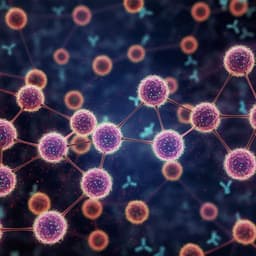
Medicine and Health
Moderate to severe SARS-CoV-2 infection primes vaccine-induced immunity more effectively than asymptomatic or mild infection
K. A. Holder, D. P. Ings, et al.
The study addresses how the severity of primary SARS-CoV-2 infection affects the magnitude, quality, and durability of hybrid immunity induced by subsequent vaccination. The context is widespread global SARS-CoV-2 transmission with variable disease severity and evolving variants that can partially escape antibody neutralization elicited by vaccines based on ancestral strains. While neutralizing antibodies to spike, particularly the receptor-binding domain (RBD), prevent infection, non-neutralizing antibody functions and T cell responses are more conserved across variants and contribute to protection from severe disease. Prior observations indicate that previously infected individuals mount stronger responses to vaccination than naïve individuals. This study compares humoral and cellular immune responses after infection and after first and second vaccine doses in individuals with asymptomatic/mild versus moderate/severe prior COVID-19 to determine whether initial disease severity differentially primes subsequent vaccine-induced immunity.
The authors summarize evidence that: (1) vaccines targeting SARS-CoV-2 spike reduce transmission and severity, though breadth and durability against evolving variants (e.g., Omicron) are challenged; (2) neutralizing antibodies focus on RBD and can be diminished by mutations, while Fc-mediated functions and T cell responses show greater conservation across variants; (3) cases of recovery without detectable antibody underscore the role of cellular immunity; and (4) hybrid immunity (infection plus vaccination) outperforms immunity from infection or vaccination alone. Prior studies reported stronger vaccine responses in previously infected individuals and greater clonal expansion of SARS-CoV-2–specific B and T cells in more severe illness. These data frame the hypothesis that infection severity may influence the strength and character of subsequent vaccine-induced humoral and cellular responses.
Design and participants: Prospective observational study of 35 individuals with confirmed or suspected SARS-CoV-2 infection between March 2020 and March 2021 who subsequently received two doses of mRNA vaccines (Pfizer-BioNTech BNT162b2 or Moderna mRNA-1273). Infection confirmation was by RT-PCR (dates available for 33/35) and/or serology (anti-spike and anti-nucleocapsid IgG). Symptom severity was self-reported and categorized as asymptomatic, mild (few symptoms <7 days), moderate (>7 days symptoms), or severe (required hospitalization). Two groups were analyzed: asymptomatic/mild (n=14) and moderate/severe (n=21). A subset was used for cellular assays (asymptomatic/mild n=8; moderate/severe n=11). A matched cohort of 30 COVID-19–naïve vaccinated controls was used for comparative humoral analyses. Sampling: Whole blood collected before vaccination and after first (PV1) and second (PV2) doses. Time from infection to sampling ranged 20–394 days; days post symptom onset (DPSO) used where applicable. Vaccine interval was approximately 2 months between doses (group-specific medians reported in Table 2; e.g., median ~64 days vs ~30 days in functional subsets). Humoral assays: ELISA measured IgG to full-length spike (FLS/S) and RBD (plasma 1:500). Optical densities normalized using a plate control human anti-RBD IgG. Neutralization measured using replication-competent recombinant eGFP-expressing Wuhan-Hu-1 spike virus (YV-S) infecting Vero cells; IC50 determined by non-linear regression. Antibody-dependent cellular cytotoxicity (ADCC) assessed using MRC-5 cells transduced to express Wuhan-Hu-1 spike; NK-mediated lysis quantified by 51Cr release at E:T 25:1 with three independent PBMC donors. Cellular assays: Ex vivo IFN-γ ELISpot measured spot-forming cells (SFC) per million PBMC after 24 h stimulation with overlapping peptide pools for spike (S) and nucleocapsid (N). For functional profiling, PBMC were stimulated in vitro with spike peptides for 7 days, then restimulated and analyzed by intracellular cytokine staining (ICS) flow cytometry to quantify CD4+ and CD8+ T cells producing IFN-γ, TNF-α, and IL-2; polyfunctionality assessed. Gating strategies distinguished CD4/CD8 subsets and cytokine-positive cells. Cell culture and reagents: Standard culture conditions (37°C, 5% CO2) for Vero, MRC-5, and Lenti-X 293T. Spike expression in MRC-5 accomplished via pLVX-IRES lentiviral vector. Overlapping peptide pools for S (15-mers with 11 aa overlap) and N (10-mers) used. Statistics: Normality assessed; comparisons used Friedman’s test with multiple comparisons (Dunn’s or Bonferroni), Mann–Whitney U test or Student’s t test as appropriate. Correlations assessed by Spearman’s rank. Two-sided p<0.05 considered significant. Analyses performed with GraphPad Prism 9.3.0.
- Primary vaccination elicited robust increases in anti-spike humoral and cellular immunity in both prior-infection groups, while the second dose about 2–2.5 months later produced only marginal or no significant additional increases when measured approximately 2 months after PV2.
- Magnitude by severity: Individuals with prior moderate/severe infection consistently exhibited higher anti-RBD and anti-FLS (spike) IgG levels than those with asymptomatic/mild infection post infection and after PV1, and this difference persisted after PV2 despite limited boosting with the second dose.
- Neutralization: Neutralizing antibody titers increased after vaccination in both groups and correlated strongly with ELISA anti-RBD and anti-FLS levels (Spearman r ~0.87–0.92, p<0.0001 in both severity strata). Median neutralization titers were significantly higher in the moderate/severe group both post infection (e.g., higher inhibitory titers; p=0.005) and after PV1 (p=0.002). Time since infection did not significantly correlate with neutralization capacity in this cohort.
- Comparison to naïve controls: Previously infected participants mounted higher anti-RBD and anti-FLS IgG responses after a single vaccine dose than matched SARS-CoV-2–naïve vaccinees.
- T cell responses (ELISpot): Spike-specific IFN-γ SFC increased significantly after PV1 in both groups (asymptomatic/mild p=0.017; moderate/severe p=0.0042) and did not significantly increase after PV2. The moderate/severe group had higher frequencies of S-specific IFN-γ–producing T cells than the asymptomatic/mild group after PV1 (p=0.0157) and after PV2 (p=0.0128). N-specific IFN-γ responses did not differ significantly between severity groups.
- Functional T cell profiles (ICS after 7-day expansion): SARS-CoV-2 S–reactive CD4+ and CD8+ T cells were detectable in both groups. In the moderate/severe group, the percentage of S-reactive CD8+ T cells significantly increased after PV1 (p=0.0417). Polyfunctional CD8+ T cell responses (e.g., IL-2+/IFN-γ+) and cytotoxic potential were more prominent in individuals with prior moderate/severe infection.
- ADCC: Antibodies enabling NK cell–mediated lysis of spike-expressing target cells were measurable post infection; activity generally wanes over time. Cross-sectional assessments indicated presence of Fc-mediated functions in convalescent plasma.
- Overall, infection severity influenced the strength of hybrid immunity: moderate/severe prior illness primed more robust and sustained humoral and cellular responses than asymptomatic/mild illness. The second vaccine dose added little to responses within the studied time frame.
The findings directly address the hypothesis that the severity of initial SARS-CoV-2 infection differentially primes the immune system for subsequent vaccination. Individuals with moderate/severe prior COVID-19 developed stronger spike-specific antibody responses, higher neutralization titers, and more robust and polyfunctional CD8+ T cell responses following vaccination compared with those with asymptomatic/mild prior infection. While one vaccine dose substantially boosted both humoral and cellular responses in previously infected individuals, the second dose provided minimal additional durable benefit when administered on a typical 2-month schedule and assessed about 2 months later. Strong correlations between ELISA-measured anti-RBD/FLS IgG and neutralization underscore the utility of quantitative serology as a surrogate for neutralizing capacity, albeit with individual qualitative differences. The relative conservation of T cell epitopes across variants supports a role for cellular immunity in sustained protection from severe disease even as neutralizing antibody breadth against emerging variants is challenged. These results suggest tailoring vaccine strategies by infection history and optimizing booster timing to maximize immune benefits, potentially emphasizing induction and maintenance of both neutralizing and Fc-mediated antibody functions and CD8+ T cell responses for broader and more durable protection.
Moderate to severe primary COVID-19 primes the immune system for stronger hybrid immunity than asymptomatic or mild infection. In previously infected individuals, a single vaccine dose elicits robust humoral and cellular responses that surpass those in naïve vaccinees, whereas a second dose confers only marginal additional increases within the observed time frame. Polyfunctional and cytotoxic CD8+ T cell responses are more prominent after vaccination in those with prior moderate/severe disease. These findings support considering prior infection severity and optimizing dose intervals when designing booster strategies. Future research should define immune thresholds predictive of protection, dissect memory T cell subset dynamics, assess breadth against contemporary variants, and determine personalized vaccination schedules based on pre-existing immunity.
- Sample size was modest (n=35), with smaller cellular assay subsets (n=8 asymptomatic/mild; n=11 moderate/severe), potentially limiting statistical power and generalizability.
- Symptom severity classification relied on self-report and may introduce misclassification bias.
- Heterogeneity in days post infection/symptom onset to sampling and in vaccine dose intervals could confound response magnitudes.
- Most measurements were cross-sectional at predefined time points; comprehensive longitudinal kinetics, particularly for Fc-mediated functions (e.g., ADCC), were limited.
- Cellular analyses employed different assay platforms (ELISpot vs ICS after in vitro expansion), which have differing sensitivities and may yield methodological variability across studies.
- Spike and peptide pools were based on the ancestral Wuhan-Hu-1 sequence; breadth against diverse variants was not directly tested in this study.
- Memory T cell subset phenotyping was limited by low frequencies and available PBMC, constraining detailed characterization.
Related Publications
Explore these studies to deepen your understanding of the subject.







